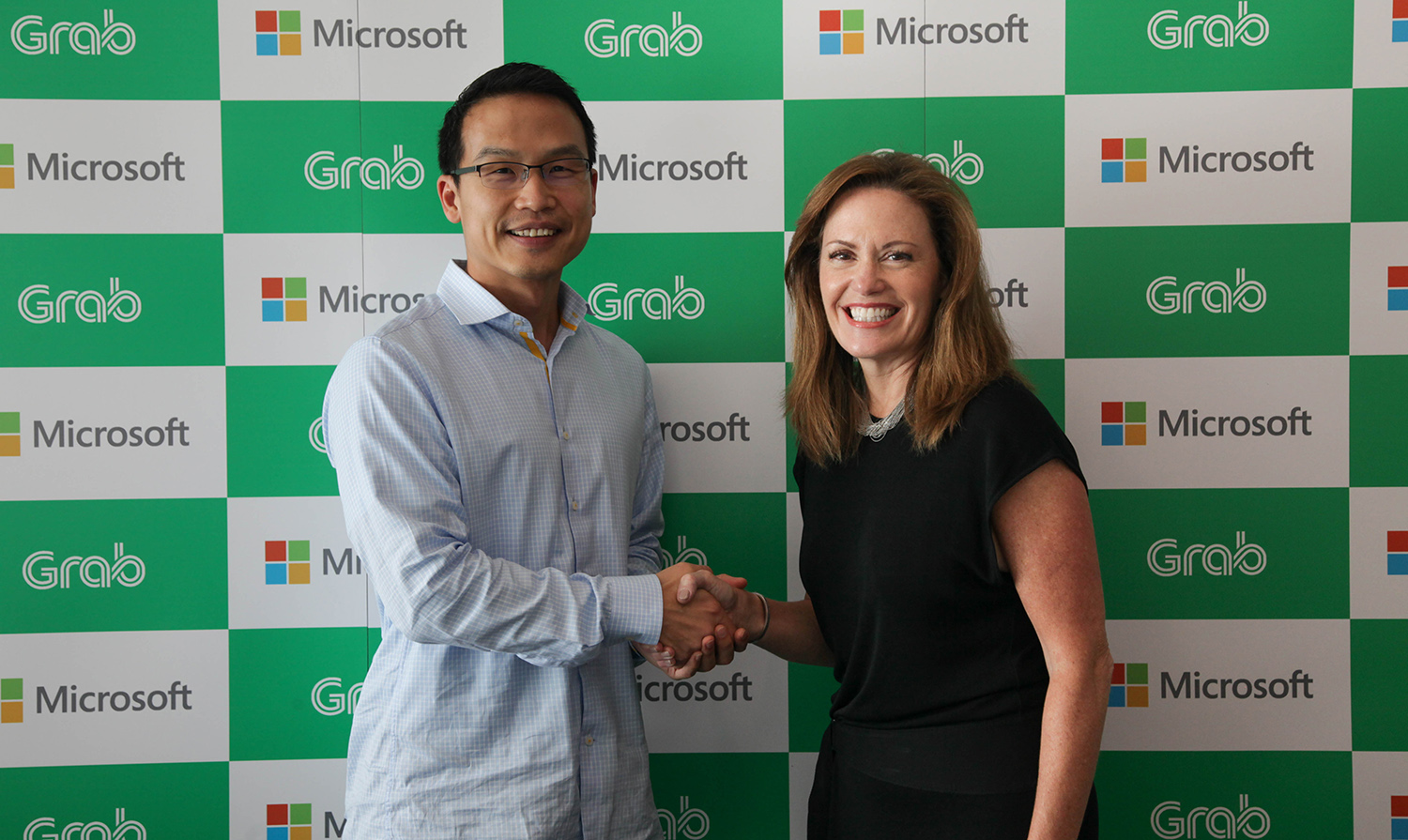Grab will adopt Microsoft Azure as its preferred cloud platform.
Microsoft will make a strategic investment in Grab.
The five-year agreement will see both parties collaborate on a range of technology projects, including big data, artificial intelligence and mobility solutions.

SINGAPORE and REDMOND, Wash. — Oct. 8, 2018 — Microsoft Corp. and Grab, the leading on-demand transportation, mobile payments and online-to-offline services platform in Southeast Asia, announced on Monday a strategic partnership that will transform the delivery of digital services and mobility in the region by leveraging Microsoft’s world-class expertise in machine learning and other artificial intelligence (AI) capabilities. As a first step in the broad collaboration between the two companies, Grab will adopt Microsoft Azure as its preferred cloud platform and Microsoft will make a strategic investment in Grab.
“This partnership signals a deep collaboration with Microsoft on an array of technology projects, including big data and artificial intelligence, that will transform the delivery of everyday services and mobility solutions in Southeast Asia,” said Ming Maa, president of Grab. “As a global technology leader, Microsoft’s investment into Grab highlights our position as the leading homegrown technology player in the region. We look forward to collaborating with Microsoft in the pursuit of enhancing on-demand transportation and seamless online-to-offline experiences for users.”
“Our partnership with Grab opens up new opportunities to innovate in both a rapidly evolving industry and growth region,” said Peggy Johnson, executive vice president at Microsoft. “We’re excited to team up to transform the customer experience as well as enhance the delivery of digital services for the millions of users who rely on Grab for safe and affordable transport, food and package delivery, mobile payments, and financial services.”
As the top mobile online-to-offline platform in Southeast Asia, Grab operates in 235 cities across eight Southeast Asian countries, and Grab’s digital wallet, GrabPay, is the leading player in Southeast Asia.
Through this partnership, Grab will adopt Microsoft Azure as its preferred cloud platform, tapping into Microsoft’s intelligent cloud and AI capabilities to scale Grab’s platform efficiently and increase its capacity and capabilities. Through this collaboration the companies will explore a number of innovative deep technology projects that will enhance and transform the Grab experience for Grab’s users, driver-partners, merchants and agents. These special innovation projects include:
Big data, AI and machine learning
- To help improve passenger and driver safety and security, Grab will work with Microsoft to explore new authentication mechanisms such as mobile facial recognition with built-in AI for drivers and customers who opt in, as a replacement for checking IDs, that help match both driver and passenger identities to the reservation.
- Grab will explore utilizing Microsoft Azure’s data analytics and fraud detection services to better predict and prevent fraudulent transactions on Grab’s platform.
- The companies plan to leverage Microsoft’s natural language processing capabilities to provide customers with contextualized real-time translations and create an AI chatbot so Grab users can engage in interactive experiences.
- Microsoft’s machine learning and AI capabilities will be used to power Grab’s advanced “recommendation engine” that analyzes user data and behavior to provide personalized services and content recommendations through the Grab application.
- Grab also plans to work with Microsoft to explore image recognition and computer vision technologies that will improve the user and driver pickup experience. For example, passengers will be able to take a photo of their current location and have it translated into an actual address for the driver.
- To improve map creation and quality, Grab plans to tap into the power of Microsoft’s machine learning capabilities.
Other areas of collaboration
- Microsoft Outlook integration. Grab will provide on-demand transportation booking options to Outlook users so they can seamlessly book rides directly in the application and be alerted with calendar reminders.
- Microsoft Kaizala. Grab will pilot Microsoft’s Kaizala, a mobile app and service for large group communications and work management, to improve the efficiency and effectiveness of Grab’s Customer Service teams.
- In-car solutions. The companies will collaborate on the deployment of in-car entertainment and productivity solutions across Southeast Asia.
- Rewards integration. Microsoft will explore integrating Microsoft Rewards Gift Cards into the Grab Rewards loyalty program.
About Grab
Grab is one of the most frequently used O2O mobile platforms in Southeast Asia, providing the everyday services that matter most to consumers. Commute, eat, deliver shopping – and pay with one e-wallet. Grab believes that every Southeast Asian should benefit from the digital economy, and the company provides access to safe and affordable transport, food and package delivery, mobile payments and financial services. Grab currently offers services in Singapore, Indonesia, the Philippines, Malaysia, Thailand, Vietnam, Myanmar and Cambodia. For more information, please visit www.grab.com.
About Microsoft
Microsoft (Nasdaq “MSFT” @microsoft) enables digital transformation for the era of an intelligent cloud and an intelligent edge. Its mission is to empower every person and every organization on the planet to achieve more.
For more information, press only:
Microsoft Media Relations, WE Communications for Microsoft, (425) 638-7777,
Hume Brophy, Grab, +65 9384 0839, [email protected]
Note to editors: For more information, news and perspectives from Microsoft, please visit the Microsoft News Center at http://news.microsoft.com. Web links, telephone numbers and titles were correct at time of publication, but may have changed. For additional assistance, journalists and analysts may contact Microsoft’s Rapid Response Team or other appropriate contacts listed at https://news.microsoft.com/microsoft-public-relations-contacts.





